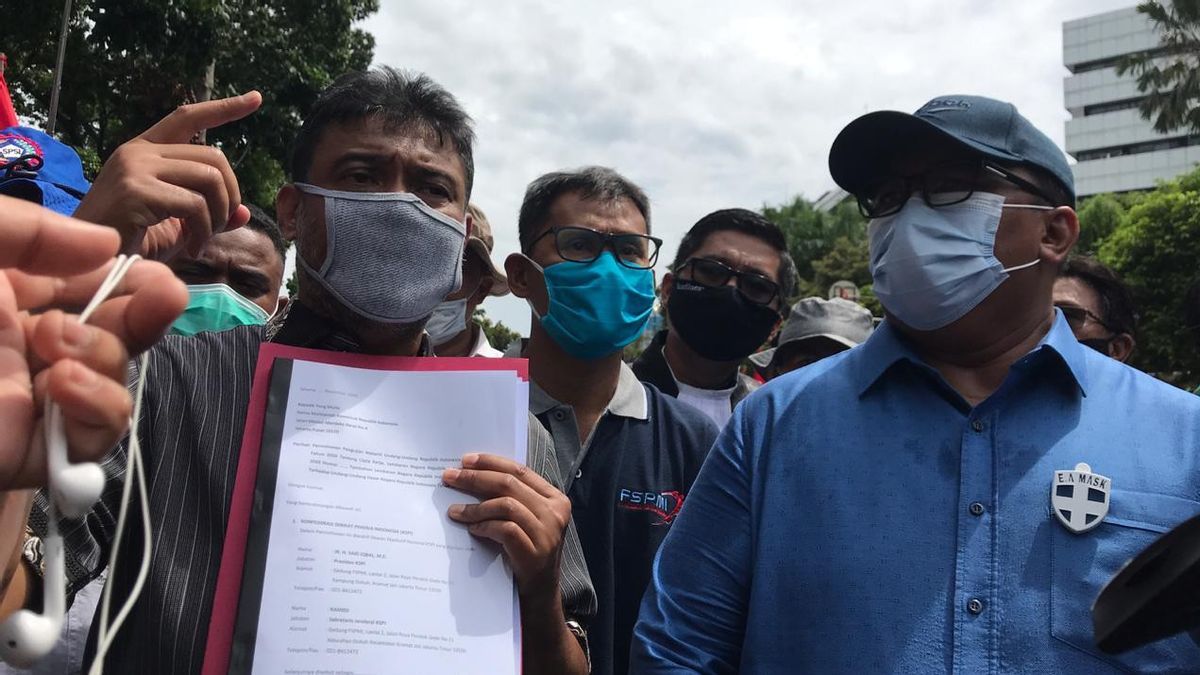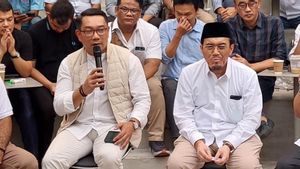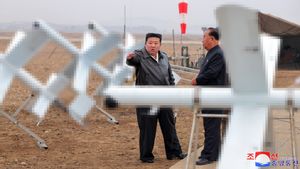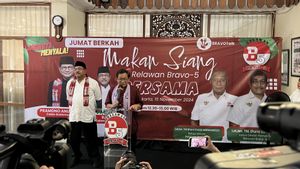JAKARTA - President of the Confederation of Indonesian Workers Unions (KSPI) Said Iqbal revealed a number of articles which were said to be detrimental to workers and workers when Law Number 11 of 2020 concerning Job Creation came into effect.
"According to a quick study and analysis by KSPI, after receiving a copy of Law Number 11 of 2020, especially the Labor Cluster, it was found that many articles were detrimental to workers," said Iqbal in a written statement, Tuesday, November 3.
Iqbal explained five provisions in the Omnibus Law that are detrimental to workers, including the following:
1. Low wages apply
Article 88C Paragraph (1) of the Job Creation Law states that the governor is obliged to set the provincial minimum wage. Article 88C Paragraph (2) states that governors can determine district / city minimum wages with certain conditions.
Iqbal said, the use of the word "can" in determining the district / city minimum wage (UMK) is detrimental to workers. Because, the governor could not set the UMK because it was not an obligation. In the end, it will result in cheap wages.
"We take the example in West Java. For 2019, West Java's UMP is 1.8 million. Meanwhile, Bekasi's UMK is 4.2 million. If only UMP is set, the minimum wage in Bekasi will decrease," said Iqbal.
2. Employee on a lifetime contract
The Job Creation Law eliminates the contract time limit contained in Article 59 of Law No. 13 of 2003. As a result, said Iqbal, entrepreneurs can contract repeatedly and continuously indefinitely. This, said Iqbal, makes it uncertain to work.
In fact, in Law No. 13 of 2003 concerning Manpower, the time for a certain time work agreement (PWKT) is limited to a maximum of 5 years and a maximum of 3 contract periods.
"Thus, after undergoing a maximum contract of 5 years, contract employees have the hope of being appointed as permanent or permanent employees if they have good performance and the company continues to run. But Law 11 of 2020 eliminates these opportunities and hopes," said Iqbal.
3. Outsorching for life
The Job Creation Law removes the 5 types of work restrictions contained in Article 66 of the Manpower Law which allows the use of outsourced labor only for cleaning services, cattering, security, drivers, and petroleum support services.
According to Iqbal, with no restrictions on the types of work that can use outsourced labor, all types of work in the main job or main job in a company can use outsourced employees.
"This gives an impression that the state legalized labor being traded and traded by agents. In fact, in the international world, outsourcing is called the modern term slavery, modern slavery," he said.
4. Deduction of severance pay
The Job Creation Law reduces the value of workers' severance pay, from 32 months of wages to 25 wages. In detail, 19 are paid by employers and 6 months through job loss guarantees paid by BPJS Ketenagakerjaan.
Iqbal said, this is clearly detrimental to Indonesian workers, because the value of old age insurance and pension benefits for Indonesian workers is still small compared to several ASEAN countries.
"Compare with Malaysia. There, the amount of severance pay is between 5-6 months of wages. But the value of old age savings and pension contributions for Malaysian workers reaches 23 percent. Meanwhile, Indonesian workers value JHT and pension only 8.7," said Iqbal.
5. Layoffs made easy
Iqbal also highlighted that the provisions for layoffs were made easy with the loss of the phrase "null and void" for layoffs that had not yet been approved by the industrial relations dispute settlement agency. Then, foreign workers who are unskilled laborers tend to enter Indonesia easily because the obligation to have a written ministerial license is changed to an obligation to have a legal plan to employ foreign workers.
"In response to this, this morning KSPI and KSPSI AGN will officially register a judicial review lawsuit to the Constitutional Court against the judicial review of Law No. 11 of 2020 on Job Creation," said Iqbal.
"Apart from making constitutional efforts through the Constitutional Court, the KSPI will also carry out continued actions and strikes in accordance with the constitutional rights of labor which are regulated in law and are nonviolent in nature," he continued.
The English, Chinese, Japanese, Arabic, and French versions are automatically generated by the AI. So there may still be inaccuracies in translating, please always see Indonesian as our main language. (system supported by DigitalSiber.id)













